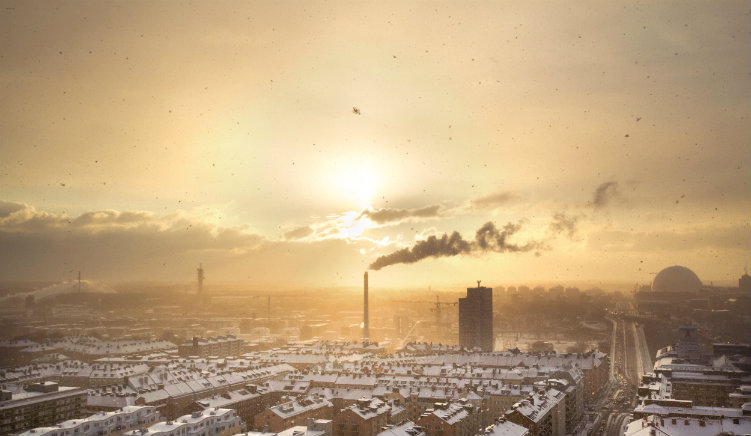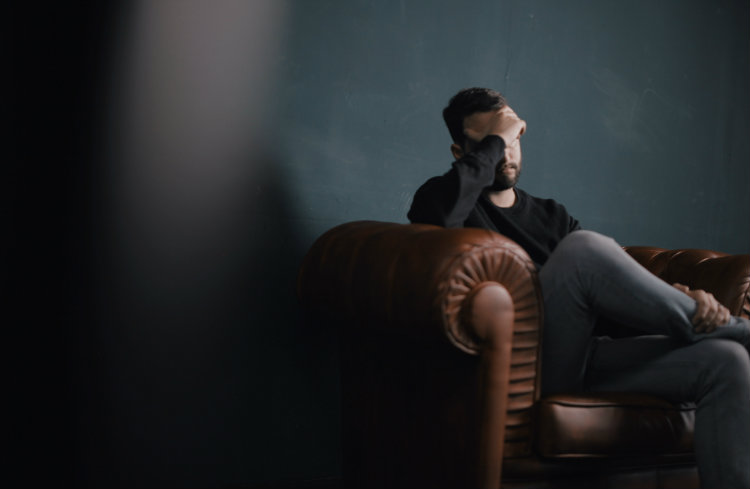Irish Essayist | 5 | Peak Oil, Prozac, and Philosophical Pessimism by Eoin Madigan
A form of literary autobiography, the personal essay allows us to ruminate on truths from our own life experiences. Every Wednesday this month, the Irish Essayist series will see writers test the continually-expanding essay format to explore subjects as diverse as mental illness, gender, music, growing up, and more.
Peak Oil, Prozac, and Philosophical Pessimism
by Eoin Madigan
When the second old friend died by suicide, I dreamed about him. I was back in secondary school – battered wooden desks, mouldy green carpet – and I had a polaroid of him in my hand. I even smiled at the sweetness of it: my subconscious gently preparing me for never seeing him in the flesh again.
As with the first old friend, my body made sense of the news before my mind the only way it knew how: a rattling sob and a scream.
In the years since, I’ve slowly been unearthing a tripartite tension at the centre of my life. It’s between the certainty that life is not inherently a good or worthwhile thing, an ecstatic optimism about humanity’s future, and a manner of middle road through the vast bandit country of compromise.
I imagine these tensions as threads being weaved through my life. Are they quietly being spun into rope, I often wonder, to await a further coiling into a noose, and then a sudden and final tension? That’s certainly how it feels at times. No sooner is one facet of life settled than another throws a tantrum for attention, the gyre narrowing all the while, circumscribed by that fucking rope.
Bear with me a few minutes while I pull at its threads.
The Absurd and Revolt
My life’s philosophical foundations were laid in college, long before either suicide. Albert Camus’s concepts of the absurd and revolt seemed to me the perfect tools with which to confront an indifferent universe. From here, it’s but a short stroll to full-blown philosophical pessimism, and it’s taken that walk for me to finally digest one of Camus’s most famous lines: You must imagine Sisyphus is happy.
Now, Sisyphus is the poor fucker from Greek mythology who was sentenced to push a boulder up a hill only to see it roll back to the bottom for him to start all over again. For all of eternity. I never quite understood how Camus expected anyone to imagine such a figure happy, and now I realise that I’ve never been able to and I never possibly can. Perhaps it’s a question of temperament, but I cannot imagine such an existence to contain much, if any, happiness. So, as you see, I haven’t so much digested the line as regurgitated it. Taking my cue from Camus, I’ve revolted against his absurd pronouncement and eventually meandered into the realm of philosophical pessimism.
But let’s take a detour first.

Peak Oil and Civilisational Collapse
A few years ago, I got lost in a pile of books about the collapse of industrial civilisation and the end of the modern world. I’ve been digging my way out ever since and feel like I’ve had to sever a limb or two in the process. There’s a lot of material out there dedicated to the idea of peak oil and its catastrophic ramifications. The theory makes sense for several reasons, not the least of which is that as our world is built on oil, a finite resource, it will someday come crashing down.
Every civilisation in history has collapsed eventually, and to think ours will be any different is hubristic in the extreme. Ask the Mayans or the Romans. The unshakeable faith that our priests – the people in white lab coats and at the head of technology companies – will somehow save us amounts to an almost religious delusion. We lay all our hopes at the altars of science and technology and progress, convinced of their ability to solve every problem that humanity creates for itself.
I no more believe in the redemptive power of the consumer-capitalist sacrament – swiping my debit card for an impulse buy – than I do in the cannibalistic Catholic version.
The more interconnected and interdependent the world gets, the more vulnerable it becomes to even the tiniest glitches in the system. The crash in 2008 exemplified it and it really should have been taken more seriously as an alarm bell for how fragile the world is. That crisis was predominantly financial; imagine what will happen when the oil runs out. How will you get to work with no petrol? Will your job even be relevant anymore? How will the supply of food be maintained? Do you know how to cultivate crops? How to purify water to drink?
No? Neither do I, but I have started buying a few books on the subjects. This worldview is essentially a form of philosophical pessimism writ large, though I didn’t learn that until a while later.

Sisyphus and the Prozac
Let’s return for a moment to Camus and Sisyphus. Even the most cursory of interpretations will tell us that Camus has given us a depressing – and all the more so for its crushing accuracy – depiction of everyday life. Clock in at nine, roll the boulder until five, go home. Do the same thing the next day. And the next. Ad infinitum. Ad fucking mortem.
You get the idea.
Over the last few years, as my mid-twenties have become my late twenties, I’ve settled into a perfectly respectable job at a very good company, and I can’t bring myself to like it. The monotony and the lack of intellectual stimulation are my own personal boulder, but I’m sure you have your very own too. We all do. Show me someone who is genuinely happy in their job and I’ll show you the exception to the rule.
So, like a lot of Irish people, I lived for the weekends, which is to say I lived for alcohol and its sweet weekly oblivion. Down and down the vicious spiral I fell, until finally it was time for a visit to the doctor. There was no rock bottom, just an exhausted realisation that something had to change, and it was easier to tackle the immediacy of the alcohol rather than the grand, overarching problem – as I see it – of work.
My doctor is a decent man, if a little blunt: “You’re a thinker, aren’t you? Well, when you think too much about life sometimes it can lead to depression.”
Wonderful, I thought, now thinking is a health hazard, like saturated fats. He might as well have delivered this line with a slap to the face. Please limit your mental diet to no more than three thoughts a day, ideally ingested beneath a stiff upper lip. How reassuring it was to learn that the higher function that supposedly elevates us above the animals also chokeslams us into the sewer of misery. Author Thomas Ligotti is right, consciousness is the mother of all horrors. Thanks for that, evolution.
Before I talked to my doctor about it, I was quite resistant to the idea of taking antidepressants, but eventually the desire to be stable and somewhat happy eclipsed my scepticism. I had been reasoning that if I was feeling depressed – and trying to dull it with booze – then this was my natural reaction to the world. Working forty meaningless hours a week and then drinking myself into oblivion every weekend just to deal with it all had caught up with me.
I turned my back on Bacchus for a spell and started taking the fucking Prozac.

Philosophical Pessimism
About a month in and the antidepressants were working wonderfully after a fuzzy first few weeks. The absence of alcohol was certainly helping too. It was around this time that I fell – no, dived headfirst into, let’s be honest – a deeper and darker hole.
I’d first come across it years ago by way of the first season of True Detective, with its beautifully interpreted philosophy-noir themes robed in a haunting aesthetic. Now, though, with the Prozac as a manner of safety net, or so I thought, I started actively digging, and eventually crashed through to the vast underground chasm of philosophical pessimism.
The first artefact I found there was The Conspiracy Against the Human Race by horror author Thomas Ligotti, a book I strongly recommend to everyone, regardless of outlook or temperament. The crux of his argument is that human existence is mostly suffering and that it would be better never to have been born at all. His treatise is a clear-sighted exploration and elaboration of the work of 18th century German pessimist philosophers Arthur Schopenhauer and Philipp Mainländer.
While Ligotti and Schopenhauer stop short of counselling suicide – as it doesn’t make us any less complicit in the “conspiracy” of existence – Mainländer took his personal philosophy to the extreme and killed himself the day after the publication of his masterpiece, The Philosophy of Redemption. He even went so far as to use a stack of advance copies of his book as a gallows scaffold. Depressing, yes, though it’s hard not to admire his conviction and his sense of poetry.
It is important to distinguish philosophical pessimism from the more quotidian seeing-the-worst-in-everything variety. I have a good life – better than most of the people on this planet, in fact (you likely do too if you’re reading this) – with things both little and large that give me joy every day. I don’t have the inclination for suicide, but this doesn’t mean that the world’s overabundance of personal, communal, and global suffering doesn’t appal me. It absolutely does.
The only conclusion that I can legitimately draw from such a philosophical outlook is that, at the very least, we should not add to the world’s suffering, and at best we should strive to alleviate it as much as possible. This is one reason among many for which I won’t be bringing children into the world; for their own sake, and for the planet’s.
All of which brings me neatly to the patchwork worldview I’ve stitched together for myself from all the preceding bits and pieces and threads.

Wind Turbines, Vegetable Patches, and Leisure
The best future for humanity that I can extrapolate from the state of the world today is one in which sustainable energy maintains a lower-population, more self-sufficient civilisation. Governments should right this minute be rolling out incentivised schemes to get any home with a front or back garden up and running with its own vegetable patches. As much time and money and research as possible should be put into sustainable energies. Wind turbines should dot the landscape and solar panels the roofs.
As automation and AI continue to develop, more thought should be given to the humans they replace. A universal basic income is looking more and more palatable, even in a consumerist-capitalist society. This could perhaps be managed by nationalising certain industries that are heavily affected by automation, or increased taxation on the use of automation and AI at the expense of humans. After all, if the average worker no longer has any money to spend, the captain of industry has no consumer for whatever product his machines are making.
One of my sincerest hopes for humanity’s future is the gradual reduction and eventual elimination of pointless work. Most modern office jobs, for example, are bullshit, and thus can and likely will one day become automated, if not done away with altogether. That most people must work eight hours a day is absurd to me, especially when their concentration lasts only about six hours. It has been hypothesised for a long time now that work behaves like a (toxic) gas: it indiscriminately expands to fill the time available for its completion.
Look around your office between the hours of three and five on an average workday and tell me that most people aren’t half switched off or already daydreaming. A reduction in work time by even one or two hours a day would go a long way to a happier and more productive workforce. Personally, I’d always rather gain time than money, and I suspect there are a great many people out there of the same opinion.
I’m finding the more I step back from the thin threads that make up my life, the better I can take in the complex tapestry in all its motifs and swathes of colour. Rather than focusing on the strands that might curl into a noose, I’m trying to pay more attention to the positive aspects. None of us really get to choose the patterns and incidents that stand out in our memories, yet the challenge we set ourselves as humans is to thread a coherent narrative through the routine and random events that make up a life.
My two friends’ suicides will always be with me, and I fully expect my mild depression to ebb and flow over the years. I’m determined, however, to make those dark and painful splashes of colour a starting point for a brighter future, for something wonderful I can weave into my life’s tapestry. Just recently, I’ve started to look back on my old friends and think, I’m sorry you had to go, boys, and sometimes I’m sorry I can’t follow.
But only sometimes.

